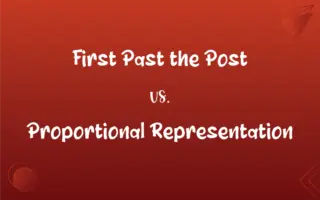Faith vs. Belief: What's the Difference?
Edited by Aimie Carlson || By Harlon Moss || Published on December 21, 2023
Faith often implies trust or confidence in a person, concept, or higher power without requiring empirical evidence, while belief is the acceptance that something exists or is true, possibly based on evidence.

Key Differences
Faith is commonly associated with spiritual or religious conviction, often independent of factual evidence. Belief, on the other hand, can be based on factual evidence and logical reasoning, in addition to personal convictions.
Faith is frequently used in the context of religion or deep personal trust, emphasizing a strong, unwavering confidence. Belief is more broadly applicable, ranging from simple acceptance of facts to complex philosophical or ideological positions.
Faith often involves a deeper emotional commitment, sometimes tied to hope or spirituality. Belief may or may not have a strong emotional component and can be purely intellectual.
Faith tends to be more steadfast and enduring, even in the absence of supporting evidence. Beliefs can change with new information or evidence, making them more flexible.
Faith often drives actions based on spiritual or moral convictions, beyond rational calculation. Beliefs influence actions too, but they are often more directly connected to logical assessment and empirical understanding.
ADVERTISEMENT
Comparison Chart
Basis
Trust or confidence without empirical evidence
Acceptance of truth, possibly based on evidence
Context
Often spiritual or religious
Broad, including factual and ideological
Emotional Component
Strong emotional commitment
Varies, can be emotional or intellectual
Flexibility
Tends to be steadfast and enduring
More flexible, changes with new information
Influence on Actions
Drives actions based on moral convictions
Influences actions based on logical assessment
ADVERTISEMENT
Faith and Belief Definitions
Faith
Complete trust or confidence in someone or something.
Her faith in her team's ability never wavered.
Belief
A religious conviction.
Buddhism is one of his core beliefs.
Faith
A strongly held belief or theory.
He had faith in the project's success.
Belief
An acceptance that something exists or is true, especially one without proof.
His belief in aliens was unshakable.
Faith
Loyalty or allegiance to a cause or person.
He swore faith to the cause.
Belief
Trust, faith, or confidence in someone or something.
Their belief in the company's vision led to its success.
Faith
Strong belief in God or in the doctrines of a religion.
His faith was an important part of his life.
Belief
Something one accepts as true or real; a firmly held opinion.
Her belief in freedom of expression was paramount.
Faith
A system of religious belief.
She was raised in the Christian faith.
Belief
A principle accepted as true without proof.
The belief in human goodness is central to her philosophy.
Faith
Belief in God or in a set of religious doctrines.
Belief
The mental act, condition, or habit of placing trust or confidence in another
My belief in you is as strong as ever.
Faith
A set of religious doctrines; a body of dogma
Adhered to the Muslim faith.
Belief
Mental acceptance of and conviction in the truth, actuality, or validity of something
His explanation of what happened defies belief.
FAQs
Is faith rational?
Faith often transcends rationality, based more on trust and confidence than logical proof.
Are beliefs always conscious?
Not always; some beliefs are subconscious or ingrained.
Is faith always religious?
No, faith can also refer to strong trust or confidence in something non-religious.
Can beliefs be proven?
Some beliefs can be proven or supported by evidence, while others cannot.
Is faith a choice?
Faith can be a choice, but it's often influenced by personal experiences and upbringing.
Is faith always positive?
Faith is generally positive but can be misguided or misplaced.
Is belief the same as opinion?
Belief is similar to opinion but is often more deeply held and may not be easily changed.
Can beliefs be changed?
Yes, beliefs can change with new information, experiences, or insights.
Do all beliefs need justification?
While many beliefs are based on justification or evidence, some are held without it.
Can faith be questioned?
Faith can be questioned, which sometimes leads to a deeper understanding or change in faith.
Does faith require evidence?
Faith typically does not require empirical evidence and is often held despite the lack of it.
Can faith exist without religion?
Yes, faith can exist in many forms outside of religion, such as faith in humanity.
Do beliefs influence behavior?
Yes, beliefs strongly influence an individual's choices and behaviors.
Is faith always unchanging?
Faith can evolve and change over time, especially as a result of new experiences or insights.
Are beliefs individual or collective?
Beliefs can be both individual and shared within a community or culture.
Can a belief be incorrect?
Yes, a belief can be incorrect, especially if disproven by facts or evidence.
Can faith be harmful?
Misplaced or extreme faith can be harmful, especially if it leads to intolerance or violence.
Can beliefs be both religious and secular?
Beliefs can encompass both religious and secular views.
How is faith expressed?
Faith is expressed through actions, words, practices, and sometimes rituals.
How are beliefs formed?
Beliefs are formed through experiences, upbringing, culture, education, and personal reflection.
About Author
Written by
Harlon MossHarlon is a seasoned quality moderator and accomplished content writer for Difference Wiki. An alumnus of the prestigious University of California, he earned his degree in Computer Science. Leveraging his academic background, Harlon brings a meticulous and informed perspective to his work, ensuring content accuracy and excellence.
Edited by
Aimie CarlsonAimie Carlson, holding a master's degree in English literature, is a fervent English language enthusiast. She lends her writing talents to Difference Wiki, a prominent website that specializes in comparisons, offering readers insightful analyses that both captivate and inform.






































































